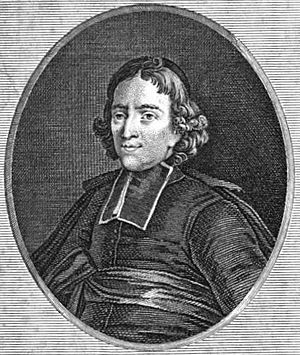Jean Meslier facts for kids
Quick facts for kids |
|
|---|---|
 |
|
| Church | Roman Catholic Church |
| Personal details | |
| Born | 15 June 1664 Mazerny, France |
| Died | 17 June 1729 (aged 65) Étrépigny, France |
| Nationality | French |
| Denomination | Roman Catholic |
Jean Meslier (French: [melje]; also Mellier; 15 June 1664 – 17 June 1729) was a French Catholic priest (abbé) who was discovered, upon his death, to have written a book-length philosophical essay promoting atheism and materialism. Described by the author as his "testament" to his parishioners, the text criticizes and denounces all religions.
Contents
Life
Jean Meslier was born in Mazerny in the Ardennes. He began learning Latin from a neighbourhood priest in 1678 and eventually joined the seminary; he later claimed, in the Author's Preface to his Testament, this was done to please his parents. At the end of his studies, he took Holy orders and, on 7 January 1689, became priest at Étrépigny, in Champagne. He lived like a pauper, and every penny left over was donated to the poor.
When Meslier died in Étrépigny, there were found in his house three copies of a 633-page octavo manuscript in which the village curate denounces organised religion as "but a castle in the air" and theology as "but ignorance of natural causes reduced to a system".
Thought
In his Testament, Meslier repudiated not only the God of conventional Christianity, but even the generic God of the natural religion of the deists. For Meslier, the existence of evil was incompatible with the idea of a good and wise God. He denied that any spiritual value could be gained from suffering, and he used the deist's argument from design against god, by showing the evils that he had permitted in this world. To him, religions were fabrications fostered by ruling elites; although the earliest Christians had been exemplary in sharing their goods, Christianity had long since degenerated into encouraging the acceptance of suffering and submission to tyranny as practised by the kings of France: injustice was explained away as being the will of an all-wise Being. None of the arguments used by Meslier against the existence of God were original. In fact, he derived them from books written by orthodox theologians in the debate between the Jesuits, Cartesians, and Jansenists. Their inability to agree on a proof for God's existence was taken by Meslier as a good reason not to presume that there were compelling grounds for belief in God.
Meslier's philosophy was that of an atheist. He also denied the existence of the soul and dismissed the notion of free will. In Chapter V, the priest writes, "If God is incomprehensible to man, it would seem rational never to think of Him at all". Meslier later describes God as "a chimera" and argues that the supposition of God is not prerequisite to morality. In fact, he concludes that "Whether there exists a God or not [...] men's moral duties will always be the same so long as they possess their own nature".
Meslier also vehemently attacked social injustice and sketched out a kind of rural proto-communism. All the people in a region would belong to a commune in which wealth would be held in common, and everybody would work. Founded on love and brotherhood, the communes would ally to help each other and preserve peace.
Meslier considered the lack of compassion and concern by Christians for animal suffering at the hands of man to be, according to Matthieu Ricard, further proof of "the nonexistence, or the malice, of their God."
Voltaire's Extrait
Various edited abstracts (known as "extraits") of the Testament were printed and circulated, condensing the multi-volume original manuscript and sometimes adding material that was not written by Meslier. Abstracts were popular because of the length and convoluted style of the original.
Voltaire often mentions Meslier (referring to him as "a good priest") in his correspondence, in which he tells his daughter to "read and read again" Meslier's only work, and says that "every honest man should have Meslier's Testament in his pocket." However, he also described Meslier as writing "in the style of a carriage-horse".
Voltaire published his own expurgated version as Extraits des sentiments de Jean Meslier (first edition, 1762). Voltaire's edition changed the thrust of Meslier's arguments (or drew on other Extraits which did this) so that he appeared to be a deist—like Voltaire—rather than an atheist.
Another book, Good Sense (French: Le Bon Sens), published anonymously in 1772, was long attributed to Meslier, but was in fact written by Baron d'Holbach.
The complete Testament of Meslier was published in English translation (by Michael Shreve) for the first time in 2009.
Legacy
In his book In Defense of Atheism (2007) the atheist philosopher Michel Onfray describes Meslier as the first person to write an entire text in support of atheism:
For the first time (but how long will it take us to acknowledge this?) in the history of ideas, a philosopher had dedicated a whole book to the question of atheism. He professed it, demonstrated it, arguing and quoting, sharing his reading and his reflections, and seeking confirmation from his own observations of the everyday world. His title sets it out clearly: Memoir of the Thoughts and Feelings of Jean Meslier; and so does his subtitle: Clear and Evident Demonstrations of the Vanity and Falsity of All the Religions of the World. The book appeared in 1729, after his death. Meslier had spent the greater part of his life working on it. The history of true atheism had begun.
The Situationist cultural theorist Raoul Vaneigem praised Meslier's resistance to hierarchical authority, claiming that "the last full-fledged exemplars of priests genuinely loyal to the revolutionary origins of their religion were Jean Meslier and Jacques Roux fomenting jacquerie and riot".
According to Colin Brewer (2007), who co-produced a play about Meslier's life,
Historians argue about who was the first overt, post-Classical atheist but Meslier was arguably the first to put his name to an incontrovertibly atheist document. That this important event is largely unrecognised (Meslier was absent from both Richard Dawkins’ and Jonathan Miller's recent TV series on atheism) is due partly to Voltaire who published, in 1761, a grossly distorted "Extract" that portrayed Meslier as a fellow-deist and entirely suppressed Meslier's anti-monarchist, proto-communist opinions.


